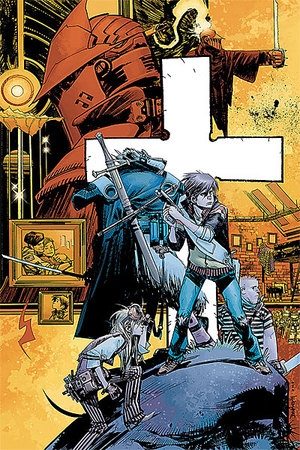Comics /
Comic Reviews /
DC Comics
Joe the Barbarian #8
By Zak Edwards
March 8, 2011 - 17:11
I don’t think anyone seriously thought Grant Morrison’s latest Vertigo story was never going to finish. Rather, the delay just made it invisible and forgotten, I certainly forgot the whole thing. When I heard last Monday the last issue of Joe the Barbarian was hitting the stands, a solid six months after the last installment, I reread the other issues to reacquaint myself, and boy am I glad I did! This series, like most of Morrison’s works, superhero or otherwise, really deserve a rereading. So many small details add to the experience and, while I’m sure the last issue would mostly make sense, I find it hard to believe it would be a rewarding experience; simply knowing Joe is having diabetes-related hallucinations in a fantasy world consisting of his toys and stuff in his room is insufficient. So, while the series was a long time coming, with no announcements, apologies, or explanations, it is certainly worth the wait and a little more time.
 |
Morrison finishes his story off in a fairly classic way but throws quite a few elements in at the end that blur the lines between reality and hallucination while Joe struggles with his dead father. At its heart, Joe the Barbarian is less about crazy fantasy worlds and more about the impact of the loss of a father and the disappointment of reality. Joe’s dad, a soldier, didn’t die fighting for freedom like in the movies, video games, or fantasies created by contemporary notions of heroism, he died by accident when his friend stepped on a mine. Moreover, he died and the government who took his life is not even looking after those left behind. Joe’s father, something I had largely forgotten, is such an important aspect of this story, and Morrison’s psychoanalytic approach to the father through fantasy drives the narrative and themes; it’s no surprise Joe must fight a character who can raise the dead and refer to himself as “daddy.” Morrison has obviously not forgotten the seeds he planted from the very beginning of the story and elements grow more significant with time, an intentionality the story truly benefits from. And yes, there is a deus ex machina solving the financial worries in a way that makes absolutely no sense. How would the bank not know about documents of ownership of the house in some capacity? Morrison’s sentimentality overtook the writing at this moment and is my singular complaint. Other than this, Joe the Barbarian is an amazing read when read altogether (except for the cliffhanger involving the people with skull masks that turn out to be good guys two pages later, that was jarring when read together), and the trade will be a better experience.
Of course, Sean Murphy’s art has been an amazing experience in of itself. Not only can Murphy take every one of Morrison’s ideas and run with it, he takes each scene, every panel, and layers the detail for an even more rewarding and beautiful experience. Joe’s house especially is designed with such presence and mood, I think Murphy’s contribution speaks to the impact of the past Morrison’s script is emphasizing. Not only is Joe displaced temporally, physically, and psychologically, his very surroundings reflect his confusion, both in and out of his diabetic episode. Murphy’s designs for the characters in the fantasy world are wonderful as well, taking familiar looking tropes of the genre and giving them a unique life. All immediately recognizable but, like the tropes the script is using, they are depicted with genuine amazement, escaping threats of copy and paste with simple enthusiasm. Murphy’s art, along with Morrison’s script, blend together thematically almost seamlessly.
Grade: A- Either wait for the trade or reread the issues, this is a wonder to behold, but only with all the facts.
Last Updated: January 17, 2025 - 08:20
